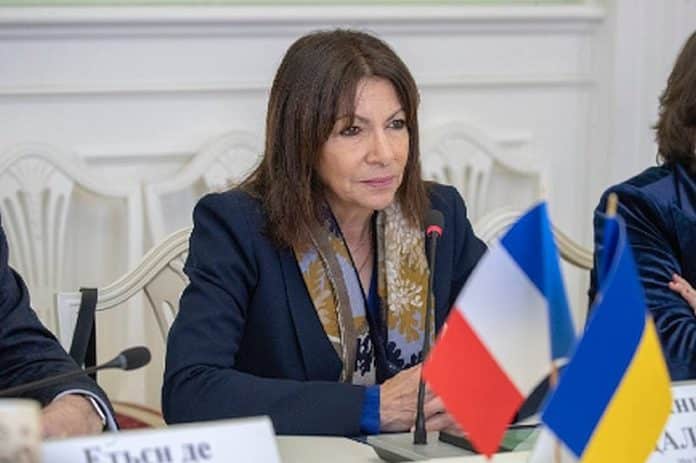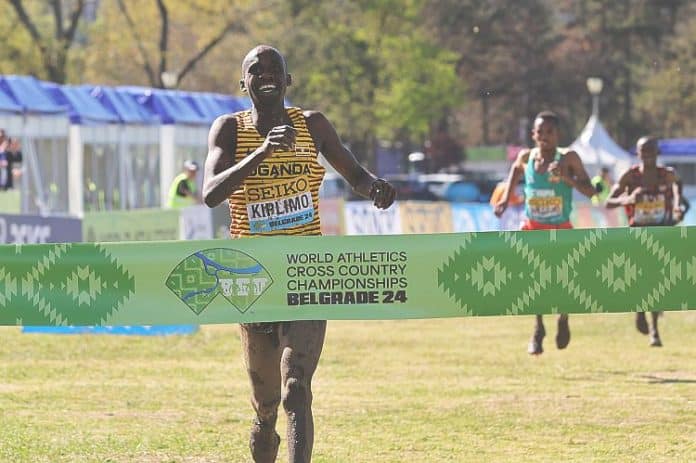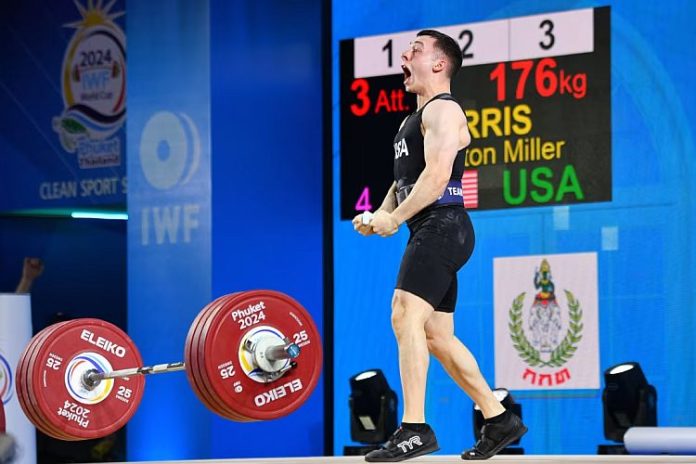★ The Sports Examiner: Chronicling the key competitive, economic and political forces shaping elite sport and the Olympic Movement.★
★ To get The Sports Examiner by e-mail: sign up here! ★
≡ THE 5-RING CIRCUS ≡
1. SafeSport announces key process changes as promised
2. Russia’s Pozdnyakov inflamed over Hidalgo’s dismissal
3. Wasserman on LA28: “To me, this is a public service”
4. IHF promoting Beach Handball with demo program in Paris
5. Star swim coach Bowman wins NCAA at ASU, leaves for Texas!
● The U.S. Center for SafeSport promised significant reforms at last month’s Congressional hearings. These were announced Monday, including a revision of its “administrative closure” process, a more efficient structure and new training for trauma sensitivity, all long requested.
● Anne Hidalgo, the Paris Mayor, said on a video recorded in Kyiv that Russian and Belarusian athletes “are not welcome in Paris.” Russian reaction was angry and bitter, even with the International Olympic Committee assuring the those “neutral” athletes allowed to compete in Paris will be accommodated in the Olympic Village.
● LA28 Chair Casey Wasserman was asked last week on The Rich Eisen Show what his grandfather – legendary entertainment giant Lew Wasserman – would think of his role, and spoke of pride, but also legacy. Former L.A. Mayor Eric Garcetti spoke directly to what that legacy will be in 2019.
● The International Handball Federation is trying to get Beach Handball into the Olympic Games and will have a three-day demonstration of the sport at the French Handball Federation during the Games in Paris this summer.
● Two days after leading Arizona State to its first-ever men’s NCAA Swimming & Diving title, coach Bob Bowman was announced as the new Director of Swimming & Diving at the University of Texas! Wow! And what happens to the many post-collegiate stars Bowman is training in Tempe?
● Panorama: Athletics (world best at Texas Relays in women’s 4×2) = Football (report from Mexico says Estadio Azteca behind on 2026 World Cup renovation) ●
1.
SafeSport announces key process changes as promised
The U.S. Center for SafeSport announced a series of organizational and policy changes for better efficiency and performance, as promised during Congressional hearings last month:
“After spending the past eight months conducting a top-to-bottom review of its processes and seeking feedback from athletes and national governing bodies (NGBs) along the way, the Center has launched an initial set of process improvements that impact nearly every aspect of its work.”
SafeSport was a significant focus of the 1 March report of the Commission on the State of the U.S. Olympics and Paralympics and the House and Senate sub-committee hearings, at which SafeSport chief executive Ju’Riese Colon was a central witness.
The changes highlight the concerns made over several years:
● The heretofore-separate Intake and Resolutions, Investigations, and Legal groups were combined into a single Response and Resolution unit for better service, and much-requested trauma-sensitivity training is being developed:
“The Center is dedicating 50% of an employee’s time to implementing a comprehensive training curriculum for its Response and Resolution department, including enhanced trauma-sensitivity training grounded in research and best practices.”
● The much-maligned “administrative closure” process is being modified:
“Center will be redefining and recategorizing Administrative Closures and Holds to provide more clarity and understanding. As a part of this change, the Center will provide to participants in its process and NGBs specific categories that explain the reason for these outcomes, without compromising Claimant confidentiality.”
● Communications will be improved: “The Center is taking steps to ensure consistent communication with those involved in its process by asking Claimants their preferred method and cadence of communication and committing to providing updates as requested. The Center will also contact Respondents every 30 days.”
● A specialized team has been formed to handle interviews involving minors.
● Deeper examination of grassroots sports: “Considering the substantial number of minor athletes competing at non-national level events, the Center began conducting audits to seek accountability deeper into grassroots sports. These audits began in January of 2024 and were announced in 2022.”
During her Senate sub-committee appearance, Colon said, “The Center is requesting legislative change to establish a definition for National Governing Bodies that is inclusive of locally-affiliated organizations, and makes clear that NGBs have oversight over them.” This change could be included in a forthcoming House bill from Rep. Deborah Ross (D-N.C.), tentatively titled the “Safer Sports for Athletes Act of 2024.”
SafeSport operates on a budget of about $23 million in 2024; Colon said at last month’s hearings that it requires $30 million a year to handle the current and foreseen caseloads.
2.
Russia’s Pozdnyakov inflamed over Hidalgo’s dismissal
The latest cause celebre for Russian sports officials came Saturday from a video posted by the Ukrainian outlet, United News, in which Paris Mayor Anne Hidalgo said “I want to tell Russian and Belarusian athletes that they are not welcome in Paris and to tell Ukrainian athletes and all the Ukrainian people that we support them very strongly.” She was visiting Kyiv and toured a training site for Ukrainian athletes.
The International Olympic Committee, in response to an inquiry from the Russian news agency TASS, explained any Russian “neutrals” will be hosted in Paris:
“Like all other athletes competing at the Paris 2024 Olympic Games, Individual Neutral Athletes are entitled to accommodation in the Olympic Village (or satellite villages, as applicable) as well as logistical support necessary for their participation in the Games.”
But Russian Olympic Committee President Stanislav Pozdnyakov, a four-time Olympic gold medalist in fencing, posted a bitter but spirited response on his Telegram page:
“In theory, if the host city is not ready to host athletes who have received the right to participate in competitions, then the IOC should at least move the Games to another place, but the IOC leadership does not comment on Ms. Hidalgo’s individual political demarche at all.
“Should silence be regarded as a transfer of authority to host the Games to the Paris authorities, who have the right to determine who they are happy with and who is not? However, the mayor of the French capital has rendered a great service to the IOC.
“Now, if there are any problems with ‘unwanted guests,’ there is always someone to point the finger at – the Paris City Hall – which ‘did not want to see’ and generally behaved not in the spirit of the Olympic Truce.
“It is not so important whether the words of the mayor of Paris are an irresponsible anti-Russian slogan or a responsible official statement of intent. After all, it is no coincidence that the capital of France is hung with Ukrainian flags, such is the political situation.
“This does not change the essence: even completely impersonal athletes from our country really do not want to [be viewed] at the Olympics. Neither the host country, which has repeatedly stated the lack of security guarantees for neutralized athletes, nor the IOC, which has done everything possible to eliminate Russia from the international sports arena and reduce to a few potential depersonalized applicants for a trip to Paris.”
That Pozdnyakov could reference the Olympic Truce in view of Russia’s continuing invasion of Ukraine is amazing, but he kept going, continuing to rail at the IOC:
“In recent years, the leadership of the international Olympic Movement has skillfully mastered the skill of proving that black is white, and shifting its own responsibility to anyone to solve custom tasks. Such as squeezing everything Russian out of the international sport usurped by them, for example. The fact that Lausanne is now a political player and the sport is completely in politics has finally been officially announced. One less myth. …
“The Olympic boycott is today about the suspension of athletes on a national basis by the IOC, which at the same time, with ‘titanic efforts,’ masterfully managed to ‘resolve problems and dilemmas’ with all parties involved, without contacting, however, at the same time in any way with the Russian side, which was also stated publicly. Olympic magic, no less.”
3.
Wasserman on LA28: “To me, this is a public service”
More on LA28 Chair Casey Wasserman’s interview on The Rich Eisen Show on the Roku Channel last week, as Eisen asked what Wasserman’s grandfather, the legendary head of MCA Universal, Lew Wasserman, would think of his role at the head of the 2028 organizing committee:
“I think he would be proud.
“To me, this is a public service. I’m giving back to the city I was born in and love. The city loves the Olympics, and if we do this right, we can truly change this city forever, and I think L.A. is one of the two or three most important cities in the world.
“And so my ability to use my skill set – look, I could not do this job in any other city in America, and I couldn’t do this job if my day job wasn’t my day job – so I’m like lucky that I have that day job and I live in Los Angeles, because if this Olympics was in New York, obviously, it’s a different perspective, right?
“We’re not building things, this is not a construction project, this is a commercial project, so my day job and my city are allowing me this opportunity, and so I’m willing to do this and work hard and have two jobs essentially and I think he’d be very proud because the legacy of the Games won’t be buildings, the legacy of the Games will be an incredible human impact that we could have for generations.”
Casey Wasserman referred to his “day job,” which is as founder and chair of his privately-owned Wasserman agency, allowing him the freedom to work on both programs at the same time. He served – at the invitation of then-Los Angeles Mayor Eric Garcetti – as the volunteer head of the Los Angeles 2024 bid effort and continues as the LA28 Board Chair, also an unpaid, volunteer position.
His grandfather was not only a giant in the entertainment arena, but also a key member of the Los Angeles Olympic Organizing Committee Board of Directors and its Executive Committee for the 1984 Olympic Games, who saw the rise of the organizing effort from the start in 1978.
Casey Wasserman’s reference to a human legacy of the 2028 Games reflects how former Mayor Garcetti talked specifically about this at the 2019 Los Angeles Sports Summit:
“Let me turn for a second back to the Olympics. Every Olympics says that they create a great legacy, and I think they mean it. And when they are bidding certainly …. It’s very important for us to remember what it is that the Olympics are about. They were about, initially, a truce – peace between warring folks in ancient times – and secondly about an opportunity of competition.
“I think for a long time we have moved away [from that]. We’ve got cities scared to bid for the Olympics because they cost so much, because people so much infrastructure for two and a half weeks; that wasn’t a very sustainable model.
“The legacy that people want to leave behind often is the last thing they are able to do because they are still trying to get the plumbing to work at the Olympic Village. We created a different model. In L.A., we made a million bucks in ‘32. We made about $250 million in ‘84 and I think we will make at least a billion dollars net in 2028, because we have the ability to look at the profitability, to think about that legacy right away and a longer time to plan.
“So I told you about the swim lessons, but it is my goal to make sure that no family looks at the opportunities for their children and says, ‘we can’t afford for them to play sports.’ … That shouldn’t be a barrier for a kid’s dreams.
“So without taking a single spot away from a boy, by adding more dollars and programming to girls with something called ‘Girls Play L.A.’ that my wife and I have led, We were able to get to 45% participation in just two years, from 25% of girls in our Rec & Parks program. That’s the sort of legacy we want to leave behind.”
If the 2028 Games do leave behind a surplus – and that is expected – then the Games Agreement between the City of Los Angeles and LA28 calls for the formation of a new, charitable entity that will continue the support of youth in sports into the future.
4.
IHF promoting Beach Handball with demo program in Paris
There’s no better place to promote a future Olympic event that at the Olympics, right? That’s the thinking behind the International Handball Federation’s beach handball demonstration program announced last week for Paris.
Four men’s and women’s teams – with a total of eight players per side (four play at any one time) – will play on three days – 27-28-29 July – at the French Handball Federation’s headquarters in Creteil, just outside of Paris. The French national team will play and the other three teams will be global all-star assemblies – from 18 countries – including American men Drew Donlin and Ebiye Udo-Udoma and Christine Mansour on the women’s side.
The reason for the show is clear. Said IHF Beach Handball Working Group Chair Giampiero Masi (ITA): “After its debut at the 2018 Youth Olympic Games, this is another step towards its presence at the Olympic Games as an official sport in the future.”
Handball joined the Olympic program at Munich in 1972 and has been part of the Games ever since, with the women’s competition added in 1976. But it has not expanded beyond that, but has had success with its beach version in several multi-sport events in recent years.
5.
Star swim coach Bowman wins NCAA at ASU, leaves for Texas!
The story was so startling that SwimSwam.com had to put a line at the top of its story: “this is not an April Fools article.”
Just two days after coaching Arizona State to its first-ever NCAA men’s Swimming & Diving title, iconic coach Bob Bowman – he who coached Michael Phelps at the North Baltimore Aquatic Club – was announced as the new Director of Swimming & Diving at the University of Texas, and the head coach of the men’s squad.
Bowman, 58, literally resurrected the Arizona State program, which he joined prior to the 2016 season. From a first season with two points in the NCAA meet, Bowman’s team emerged after the pandemic, placing sixth nationally in 2022, second in 2023 and won the 2024 title, led by French star Leon Marchand, who won three individual events for the second year in a row.
Now he’s headed to Austin, to take over from another legend, Eddie Reese, who is finally retiring – after a false start in 2021 – after 46 years, leaving an unparalleled legacy of winning a record 15 NCAA team championships. Reese will formally conclude his tenure at Texas at the end of the U.S. Olympic Trials in June.
Texas will be Bowman’s third collegiate stop. He started at Michigan, from 2004-08, then went to Baltimore and to Arizona State.
Bowman’s move will have repercussions for the U.S. national team and others. In addition to his duties with the Sun Devils, he has been working with a group of world-class swimmers including Olympic stars Simone Manuel, Olivia Smoliga, Regan Smith, Chase Kalisz, Jay Litherland, Allison Schmidt and others.
And, of course, he is Marchand’s coach. Do some or all follow him to Austin? When?
The Texas women’s team, NCAA runners-up the last three years, will continue to be coached by Carol Capitani, under Bowman’s overall direction.
Arizona State named Associate Head Coach Herbie Behm to take over for Bowman.
≡ PANORAMA ≡
● Athletics ● More highlights from the weekend, including the first sub-10 clocking of the season in the men’s 100 m, from Nigeria’s Favour Ashe, an Auburn junior, who won the Florida Relays in 9.99.
At the Texas Relays, the four-nations quartet of Dina Asher-Smith (GBR), Rhasidat Adeleke (IRL), Lanae Thomas (JAM) and St. Lucia’s Julien Alfred won the women’s 4×200 m in a world-best time of 1:27.05. That’s better than the listed world record of 1:27.46 by the “USA Blue” team at the 2000 Penn Relays, but World Athletics only recognizes relay records with all of the team members from one country. So it’s a world best now.
The same quartet won the women’s invitational 4×400 m in 3:25.31, no. 2 in the world for 2024.
● Football ● Chatter about Mexico’s historic Estadio Azteca and the 2026 FIFA World Cup, with 365ScoreMexico posting on X (ex-Twitter) last Friday (computer translation from the original Spanish):
“AZTECA STADIUM DELAYED.
“@365scoresmx has learned EXCLUSIVELY that the Azteca Stadium did NOT pass the FIFA tests for the 2026 World Cup.
“The first report of the year has arrived and the Azteca is DELAYED by 6 months according to its planned renovations.
“Unlike BBVA [Monterrey] and Akron [Guadalajara], which are going according to plan.”
There’s a couple of years to go, but the worrying can start anyway.
¶
You can receive our exclusive TSX Report by e-mail by clicking here. You can also refer a friend by clicking here, and can donate here to keep this site going.
For our new, 920-event International Sports Calendar for 2024 and beyond, by date and by sport, click here!

























